
29 May Keeping Your Pets Comfortable This Winter
Arthritis, which is inflammation of the joints, doesn’t just affect humans, it affects dogs and cats too! In fact, 1 in 5 dogs will develop arthritis at some stage in life, and not just when they are older!
Many of our feline friends also suffer from the pain arthritis causes, but they are very good at hiding their discomfort!
As we head into cooler weather, arthritic pain often worsens, and this can really affect your pet’s quality of life. It’s important to know the signs of arthritis and to come in to see one of our vets to discuss effective management for this condition.
So what causes Arthritis?
Arthritis occurs when the cartilage lining of the joint wears down, resulting in inflammation, swelling and pain. This can happen as a result of wear and tear in older animals, traumatic injuries involving the joints, poor structure or development in growing animals, or excessive weight gain.
What are the signs of Arthritis in Dogs?
- Stiffness/difficulty getting up
- Difficulty climbing stairs or jumping into cars
- Lagging behind on walks
- Licking or chewing at their joints
- Reduced activity – reluctance to play or walk
- Personality changes – less happy or sometimes irritable
- Reduced appetite
- Limping or lameness
What are the signs of Arthritis in Cats?
- Hesitant to jump to or from heights
- Difficulty getting into/out of litter tray, and toileting accidents
- Reluctance to climb stairs
- Reduced grooming/ coat looking scruffy
- Personality changes – aggression when petted, less interaction with you
- More time sleeping
- Reduced appetite
- Limping or lameness

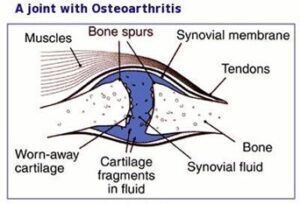
How is Arthritis diagnosed?
Arthritis is diagnosed with a physical examination by one of our vets. It then may require x-rays if further investigation is needed.
Treating Arthritis
Arthritis cannot be cured, but it can be managed so that your pet does not suffer with the pain associated with it. At Tallebudgera Vet we will tailor a plan for your pet that may included one or more of the following.
Zydax Injections – A disease modifying osteoarthritis drug:
- Stimulates cartilage producing cells to produce healthy cartilage.
- Slows cartilage damage by destructive enzymes.
- Stimulates joint capsule cells to produce lubricating joint fluid.
- Reduces swelling and blocks inflammatory processes.
- Improves blood flow and nutrition to joint structures. It is initially given as a course of four injections one week apart. We then highly recommend coming in each month for a booster. It only takes a few minutes!
NSAID’S – Non-Steroidal Anti-Inflammatory Drugs:
These drugs are very useful in the acute painful episode of arthritis, and act by reducing the inflammation responsible for the pain and degeneration of the joint. In some cases of chronic arthritis, dogs may need to stay on these drugs for a prolonged period of time to be able to have a reasonable quality of life. An initial dose is given to control symptoms and then gradually reduced to a level where the animal is pain free. Occasionally only short courses are necessary to control flare-ups.
With long term use of some medications it is recommended for your pet to have a blood test before they commence and every 6 months to ensure optimal health and reduce the incidence of side effects. Medications used: Meloxicam, Previcox & Cartrophen
Joint support supplements (Nutraceuticals):
Joint support supplements are one of the easiest ways to help improve joint health, they are administered daily in the food or as a treat and there are no side-effects. Joint support supplements we recommend are PAW Osteocare, PAW Osteosupport & 4Cyte. 4Cyte granules or 4cyte epiitalis liquid in particular assists in the regeneration of cartilage surfaces.
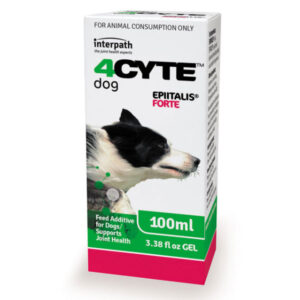
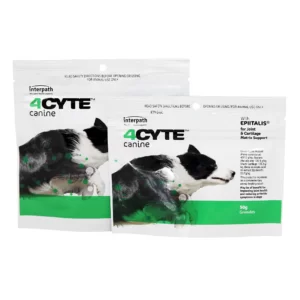
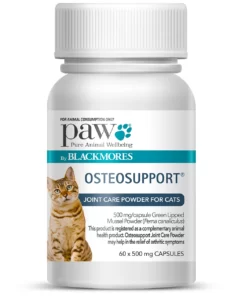
There are many ways in which you can help to relieve the symptoms or arthritis:
- Heat packs on effected areas
- Physiotherapy
- Acupuncture
- Gentle massages
- Exercise therapy
- Swimming! (Very valuable to maintain muscle strength around damaged joints)
You can also help your best friend by modifying things at home so getting around isn’t so challenging:
- Non-slip flooring &use of non-slip mats
- Limited stair climbing/hills
- Ramps climbing into car
- Steps for climbing onto furniture
- A comfortable supportive bed to sleep on
- Warm/weatherproof coats in winter
- Consistency with exercise and weight control

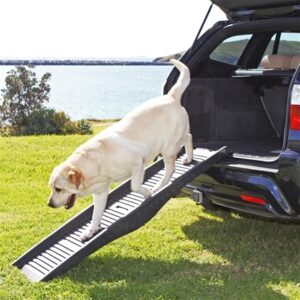
Weight Management In Osteoarthritic Patients
Many pets can show SIGNIFICANT improvement after weight loss so no further therapy is required.
If your pet is overweight there is an unnecessary increase in the load the joints must bear-thus accelerating the damage to the cartilage and adding to the pain and discomfort. Reduced meal sizes and low-fat foods maybe needed, as well as switching to a prescription diet such as Royal Canin Obesity Management, Royal Canin Mobility, Hills Metabolic/Mobility & Hills J/D. If you need help deciding on which food is right for your pet, pop into the clinic our friendly staff will assist.
Senior pets also require less food as their metabolism is slower and hence weight can is achieved more easily. It is recommended for a senior overweight pet to have a full physical, weigh in, orthopaedic examination and blood test including thyroid screen. A suitable exercise program can be developed to suit your lifestyle and your individual pets needs. For dogs, start with as little as 5 minute lead walks three times a day. For other dogs that are coping better, longer walks, swims and uphill work may be more appropriate.
Book an appointment with one of our vets today, to discuss a program and management plan for your pet. Let’s make them nice and comfortable this winter!


